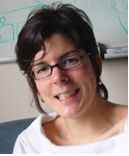
Hanne De Jaegher
Between jobs, applying for postdoc positions and funding
Title of doctoral thesis : Social Interaction Rhythm and Participatory Sense-Making: An embodied, interactional approach to social understanding, with implications for autism
Publications :
Di Paolo, E., M. Rohde, H. De Jaegher (in press). Horizons for the enactive mind: Values, social interaction, and play. Enaction: Towards a New Paradigm for Cognitive Science . J. Stewart, O. Gapenne and E. Di Paolo. Cambridge, MA, MIT Press.
De Jaegher, H. and E. Di Paolo (to appear). Making sense in participation. An enactive approach to social cognition. Enacting Intersubjectivity: A Cognitive and Social Perspective to the Study of Interactions . F. Morganti, A. Carassa and G. Riva. Amsterdam, IOS Press.
De Jaegher, H. and E. Di Paolo (In preparation). "Participatory Sense-Making." Phenomenology and theCognitive Sciences .
A few representative conference presentations :
De Jaegher, H., R. K. Wood, E. A. Di Paolo (2006). How does interactional coordination come about? Probing situated social cognition. Situated Cognition: Perspectives from Phenomenology and Science .Durham University, Durham, UK.
De Jaegher, H. (2006). Are people with autism the mindreaders here? European Society for Philosophy and Psychology . Belfast, UK.
De Jaegher, H. and Torrance, S. (2005) "The Experience of Autism: An Enactive Approach" Constructing Consciousness, Mind and Being. British Psychological Society, Oxford, 16-18 Sep
Di Paolo, E. A. and H. De Jaegher (2005). Inter-action matters:Sketches of a radical enactive approach to social understanding. Perception, Intersubjectivity and Development Symposium . MiddlesexUniversity Archway Campus, Whittington Hospital, London.
De Jaegher, H. (2003). One body is not enough. Intersubjectivity and Embodiment Conference . HogerInstituut voor Wijsbegeerte, Katholieke Universiteit Leuven, Belgium
De Jaegher, H. (2003) "No Cognition without Development: Perception, Intersubjectivity and Autism" Enactive Consciousness: Perception, Intersubjectivity and Empathy, British Psychological Society, Oxford
Research theme
How do people understand each other in their everyday encounters?
Traditionally, answers to this question have been based on cognitivist, representationalist and individualistic premises. It was thought that the people we interact with are puzzles we have to (cognitively) solve. Enactivism however proposes that cognisers actively engage with their world, an engagement that engenders meaning and value for the cogniser. They characterise cognition as sense-making .
I develop an extension of the notion of sense-making into the social (interpersonal) domain , based on a focus on the interaction process rather than on individual capacities (such as simulation and mind-reading), and on the temporal coordination dynamics of persons in interaction. Social interaction can then be seen as the regulated coupling between two autonomous agents, a regulation that is aimed at aspects of this coupling itself, in which the autonomy of the agents involved is not destroyed. Social cognition is characterised as participatory sense-making : the active engagement of a social cogniser in an interaction, in which coordination plays a crucial role. If movements are the tools and expressions of sense-making, and people can coordinate their movements - including utterances - in social interactions with each other, then they can coordinate their individual sense-making activities. I am currently working on the implications of this perspective.
Keywords: intersubjectivity, social interaction, social cognition, dynamical systems, sense-making, autism, learning .Video and experimental material